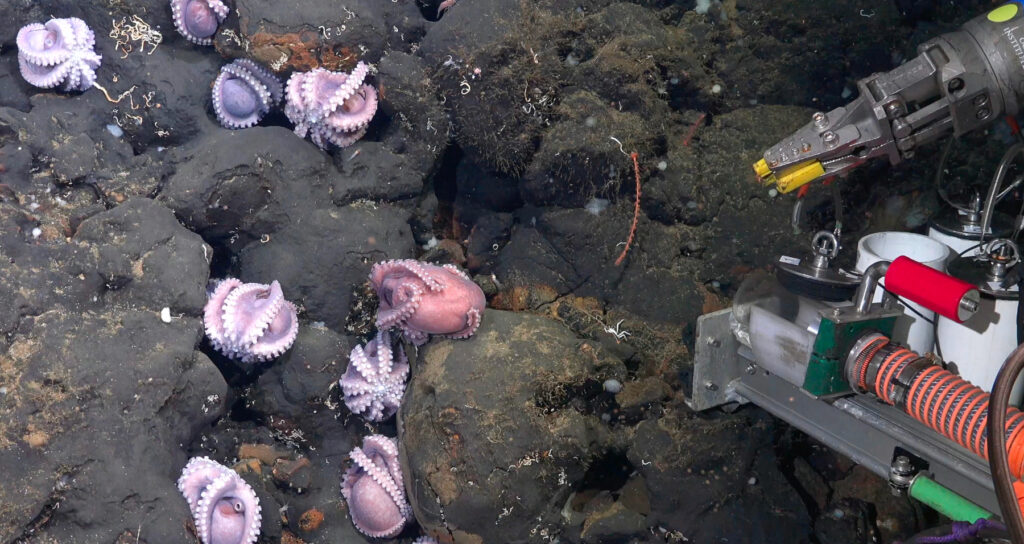In a groundbreaking revelation that unravels the hidden wonders of the ocean’s depths, scientists aboard the R/V Falkor have uncovered the existence of at least four previously unknown species of deep-sea octopus in a 100-square-mile expanse off the picturesque coast of Puntarenas, Costa Rica. This extraordinary discovery emerged from two meticulously orchestrated expeditions conducted in 2023, shedding light on the rich biodiversity thriving in the Pacific’s enigmatic underwater realms.

Deep-Sea Exploration: A Tale of Discovery and Wonder
The scientists embarked on a mission to explore seamounts off the Pacific coast of Costa Rica, venturing into the heart of the ocean’s mysteries. Their efforts bore fruit as they stumbled upon two octopus nurseries intricately affiliated with hydrothermal springs during the initial expedition in June 2023. Astonishingly, a return visit six months later confirmed that these nurseries remained active throughout the year.
Identifying the Marvels: The Work of Dr. Janet Voight and Fiorella Vasquez
At the forefront of this scientific marvel are Dr. Janet Voight and Fiorella Vasquez, who are diligently engaged in the task of identifying and describing the newfound octopus species. Among the revelations is a new species of Muusoctopus, christened the Dorado Octopus after the locale of its discovery—El Dorado Hill. This underwater cryptic beauty joins the ranks of the diverse marine life, marking a milestone in our understanding of the ocean’s inhabitants.
Into the Abyss: Unveiling the Behavioral Secrets of Deep-Sea Octopuses
Observing these elusive creatures in their natural habitat has offered profound insights into their behavior. The sight of brooding mother octopuses near a small outcrop of rock, aptly named El Dorado Hill, paints a vivid picture of the creatures’ maternal instincts. The defensive posture of these cephalopods, curling up with tentacles and suckers facing outward, serves as a cryptic dance of survival, believed to ward off potential predators. Female octopuses, during their brooding phase lasting multiple years, abstain from eating and meet their inevitable demise around the time their eggs hatch—a poignant testament to the wonders and sacrifices of marine life.
Conservation Odyssey: Safeguarding the Deep-Sea Denizens
While the discovery of these new octopus species unfolds, the urgency to preserve their habitats becomes apparent. The expeditions amassed a collection of over 160 deep-sea animal specimens, a significant departure from tradition as they find a home at the Museum of Zoology at the University of Costa Rica. This archiving move fosters accessibility for local scientists and students, ushering in a new era where research on deep-sea life can be conducted on native soil. The emphasis on conservation stems from the looming threats faced by these newfound species, underlining the delicate balance that exists in their oceanic ecosystem.
Beyond Octopuses: A Variety of Oceanic Marvels
The revelations from the Falkor expeditions extend beyond the realm of octopuses. The scientific team unearthed a thriving deep-sea skate nursery atop another seamount, whimsically dubbed Skate Park. Furthermore, the identification of three hydrothermal springs with distinct fluid temperatures and chemistries alludes to unique reaction processes facilitating their formation. The collaborative efforts of the Schmidt Ocean Institute echo the spirit of international cooperation, envisioning future operations off Peru and Chile in 2024, with a shared goal of unraveling more mysteries lurking in the ocean’s depths.
The Architects of Exploration: Organizations at the Helm
Integral to this scientific odyssey are the organizations steering the exploration. The Schmidt Ocean Institute, established in 2009, emerges as a catalyst for impactful scientific research and observation about the ocean. Collaborators such as the Bigelow Laboratory for Ocean Sciences, a nonprofit research institute dedicated to studying global ocean health, and the University of Costa Rica, a higher education institution championing humanist teaching, contribute their expertise to this collective endeavor. Meanwhile, Chicago’s Field Museum stands as a bridge connecting people to the natural world, actively engaged in extensive scientific research.
In the evolving narrative of our planet’s mysteries, the discovery of these new deep-sea octopus species adds another chapter, further beckoning us to explore the wonders that lie beneath the ocean’s surface. As the scientific community delves deeper into the abyss, the revelations from Puntarenas serve as a testament to the inexhaustible wonders that our oceans hold.
For more information, visit www.schmidtocean.org.
